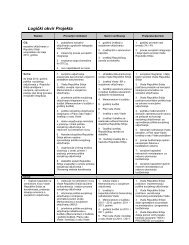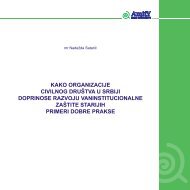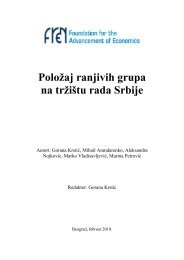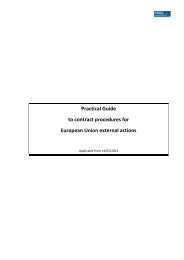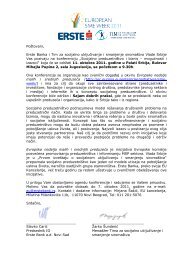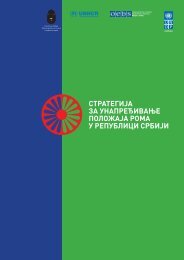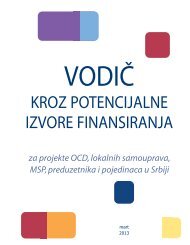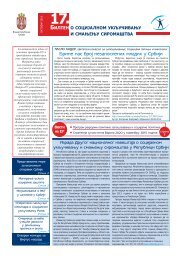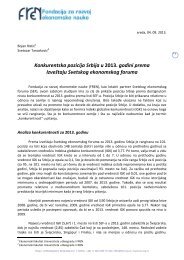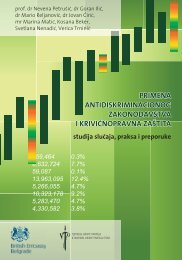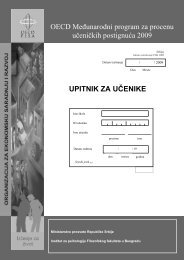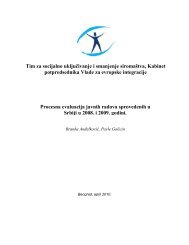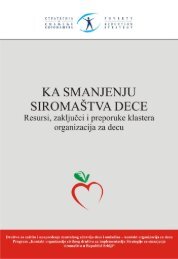Living Standards Measurements Study - Serbia 2002 - 2007
Living Standards Measurements Study - Serbia 2002 - 2007
Living Standards Measurements Study - Serbia 2002 - 2007
You also want an ePaper? Increase the reach of your titles
YUMPU automatically turns print PDFs into web optimized ePapers that Google loves.
Table 11.8. Estimation of the necessity of irrigation by region<br />
Belgrade Vojvodina West <strong>Serbia</strong> Sumadija East <strong>Serbia</strong> SE <strong>Serbia</strong><br />
Not necessary 42.8 41.5 51.1 37.7 52.8 24.1<br />
Necessary for part of arable land 14.7 21.0 24.7 23.1 17.8 42.5<br />
Necessary for all arable land 42.5 37.5 24.2 39.2 29.4 33.4<br />
Total 100% 100% 100% 100% 100% 100%<br />
N=1303<br />
11.16. Conclusions<br />
1. In <strong>Serbia</strong>, water supply and sanitation services<br />
reveal important differences by settlement type<br />
and region. There is wide discrepancy in access<br />
to piped (centralized) services between Belgrade<br />
and rural areas, while secondary towns are in<br />
between depending on the region they are<br />
located in. The quality and availability of service<br />
in Belgrade is mostly satisfying.<br />
2. The priority of the people is not having a 24 hour<br />
service but a regular, safe and reliable service.<br />
The services in rural areas require improvement<br />
and centralized water supply and sanitation<br />
services could be extended to those rural areas<br />
where services are not available. Currently, only<br />
the rural areas closer to urban settlements<br />
especially close to Belgrade benefit from<br />
extension of services.<br />
3. WSS investments appear to be more needed in<br />
some regions than in others. For example, the<br />
conditions are generally satisfactory in the<br />
Belgrade region; but the survey illustrated that<br />
East <strong>Serbia</strong> is lagging behind in connections and<br />
overall water availability, thus investments to<br />
this region to enhance the standards would be<br />
important.<br />
4. Rural households are the most disadvantaged.<br />
Rural households not only lack centralized water<br />
but also sewerage. Connection to central piped<br />
sewerage system among rural households is low.<br />
5. Outside urban areas, solid waste management<br />
services are not available.<br />
6. Irrigation and drainage system is in an<br />
emergency state in Vojvodina, and Sumadija.<br />
Endnotes, Part 11<br />
1 All serial numbers ending with an even number<br />
2 Bartol Letica, a WB qualitative interviewer, visited Belgrade,<br />
Kraljevo, Krusevac and Zrenjanin and a number of villages in<br />
Nis, Kraljevo, Zrenjanin counties and Podavalje region.<br />
Discussants and counterparts in these locations included local<br />
authorities, water management companies, small businesses,<br />
hospital and school directors, salespeople working in shops<br />
selling WSS equipment and parts, and individual households.<br />
Most of the interviews were one-on-one while some gradually<br />
developed into focus groups format as more interested<br />
residents/interlocutors joined the conversation by offering<br />
their opinions and views. Some of his results are presented<br />
here.<br />
3 “Federal Republic of Yugoslavia: Water Supply, Wastewater<br />
and Solid Waste Management,” p. 2.<br />
4 Improved sources of water include public and rural water<br />
supply, public tap/standpipe, dug well, protected dug well or<br />
standpipe, bottled water. Unimproved sources include<br />
unprotected well or standpipe, tanker truck or<br />
lake/river/stream.<br />
5 The sources of water used for purposes other than drinking<br />
(cooking and bathing) were similar to those indicated for<br />
drinking<br />
6 The most telling instance of this came out during a qualitative<br />
interview in one of the villages in Podavalje where two<br />
neighbors had a very serious argument and stopped talking:<br />
regardless, one sent a message to the other through another<br />
neighbor that all that did not mean that he could not still get<br />
the water from the well.<br />
7 Calculation based on 1978 households who gave a non-zero<br />
amount<br />
8 SE <strong>Serbia</strong> has no responses to this question as they all<br />
respondents in this ED stated that the drainage system was not<br />
at all developed<br />
In terms of the necessity for irrigation this was rated highest in<br />
Belgrade and the lowest in West <strong>Serbia</strong>.<br />
Water and Sanitation Services<br />
161



